Heating Repairs Made Easy: How to Fix Your Heater in No Time
Nov 22, 2023
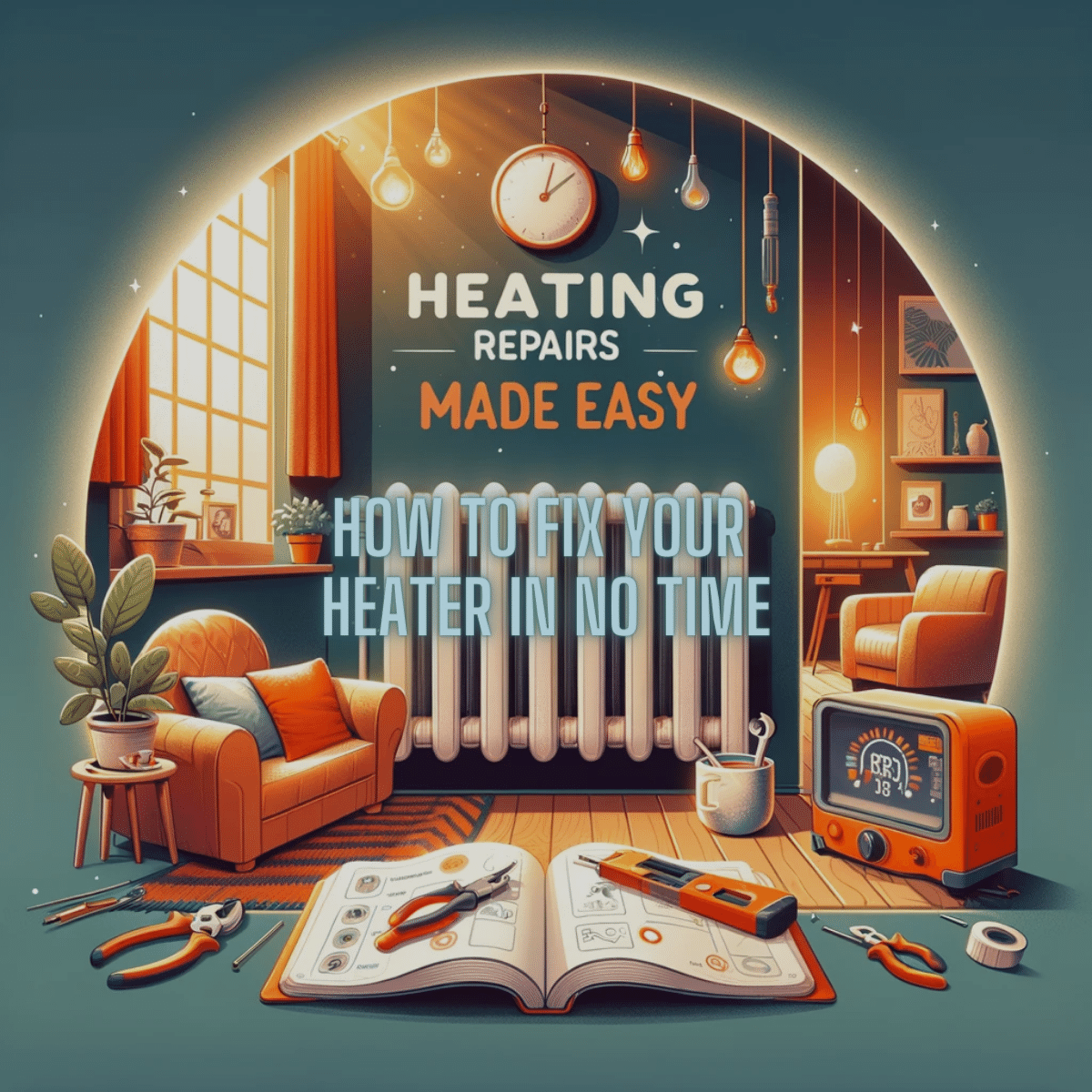
Are you tired of dealing with a malfunctioning heater and the resulting discomfort? Fear not! This comprehensive guide aims to help you understand your heating system, diagnose common issues, and determine when to tackle repairs yourself or call in the professionals.
Read on to discover how to keep your home cozy and save money on heating repairs.
Key Takeaways
- Gain an understanding of heating systems to maintain them effectively and avoid costly repairs.
- Professional maintenance, energy efficiency upgrades, and regular inspections are key for preventative care.
- Consider replacing your system if you experience frequent repairs, rising energy bills or have an aging system to get more efficient results.
Understanding Your Heating System

Effectively maintaining your furnace or heating system and identifying potential problems requires an understanding of the various components of heating systems like furnaces, heat pumps, and boilers.
Gaining knowledge about these systems’ inner workings allows you to proactively address issues and avoid escalated furnace repair costs in the future, such as frequent air filter replacement.
Furnace Components
A furnace consists of a heat exchanger, blower motor, and ignition system, all of which work in unison to generate heat for your home, often using natural gas as a fuel source. Homeowners can address common issues such as air filter maintenance, thermostat battery and connection checks, clearing condenser debris, and inspecting furnace pilot lights and burners to prevent cold air from entering the home.
Addressing these minor issues helps prevent serious problems and reduce furnace repair costs.
Heat Pump Components
Heat pumps are another type of heating system that utilizes several components to transfer heat between two locations. These components include:
- Compressor
- Expansion valve
- Evaporator coil
- Condenser coil
- Refrigerant lines
- Reversing valve
- Indoor and outdoor units
While heat pumps are most effective in mild climates without drastic temperature variations, they may be less efficient in extremely low temperatures.
Comprehending the main components of a heat pump assists in maintaining its efficiency and addressing potential problems.
Boiler Components
Boilers provide heat through the circulation of hot water and steam, with the heat exchanger, burner, and circulation pump being responsible for heating water and distributing it throughout the home. Radiators in a boiler system ensure even heat distribution in each room.
Regular boiler repair and maintenance ensure year-round optimal operation, and efficient teams like Air Pros USA can promptly and effectively solve any boiler issues.
Common Heating Repair Issues
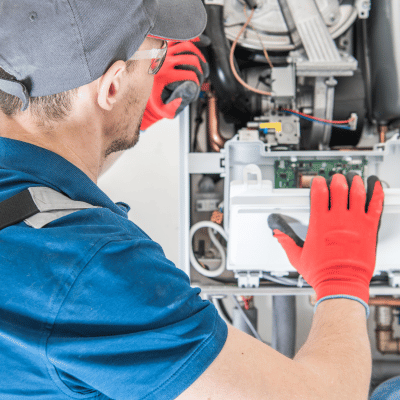
As a homeowner, you may encounter common heating repair issues such as:
- Ignition problems, which can hinder the proper functioning of your heating equipment
- Airflow issues, which can result from inadequate duct cleaning, debris accumulation, or air filter clogs
- Thermostat malfunctions, which can cause cold or lukewarm air temperatures and short cycling when a heater erratically turns on and off.
Awareness of these issues assists in addressing them before they worsen and affect your heating system’s efficiency and comfort.
Ignition Issues
Furnace ignition problems can arise from a variety of factors, including gas line issues, malfunctioning thermostats, dirty furnace filters, or defective igniters and pilot lights. Ignition issues can lead to delayed ignition, poor flame retention, or increased risk of ignition failure.
To identify and resolve these issues, check the thermostat settings, inspect the gas line for blockages or leaks, and examine the igniter and pilot light for damage signs. If the issue continues, it is advisable to contact a professional.
Airflow Problems
Airflow problems can stem from:
- Blocked vents
- Obstructed condenser units
- Clogged air filters
- Accumulation of debris in the outdoor unit
A dirty filter, for instance, can impede the airflow into the heating system, increasing strain on the fan motor and decreasing system performance. Blocked vents can cause a decrease in energy efficiency, uneven temperature distribution, and weak airflow throughout the system, leading to poor indoor air quality.
Rectifying these issues requires clear and unobstructed air ducts, clean filters, and fully functional components.
Thermostat Malfunctions
Thermostat malfunctions can result from off-kilter or dirty thermostats, improperly calibrated thermostats, outdated technology in older thermostats, or power issues such as depleted batteries or tripped circuit breakers. A malfunctioning thermostat can cause miscalibration, improper installation, or short-cycling, leading to reduced system efficiency.
Rectifying these issues involves:
- Verifying the thermostat settings
- Replacing batteries if needed
- Ensuring correct thermostat placement and regular maintenance
- Identifying and resolving any thermostat problems.
DIY Heating Repairs vs. Professional Help
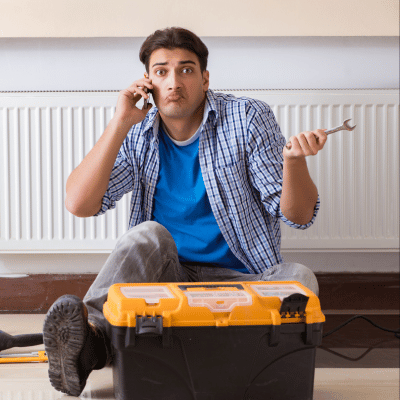
DIY heating repairs can help homeowners save money on straightforward fixes, such as replacing air filters or checking thermostat batteries, but complex issues like gas leaks, carbon monoxide poisoning, or electrical hazards necessitate professional help.
Recognizing when to handle repairs independently or seek expert assistance, such as emergency heating repair, ensures the safety and proper operation of your heating system.
Simple Fixes Homeowners Can Tackle
Homeowners can easily handle simple fixes like cleaning and replacing air filters, wiping down vents on a monthly basis, and checking thermostat batteries. Performing these tasks regularly can help maintain the efficiency of your heating system, prevent breakdowns, and save on repair costs in the long run.
When to Call a Professional
For complex heating system issues like gas leaks, carbon monoxide, or electrical problems, professional assistance is necessary to guarantee safety and correct repairs. Attempting to handle these issues yourself may result in more damage, invalidated warranties, or even hazardous outcomes.
Trusting the experts for complex repairs is the best way to keep your heating system functioning optimally and safely.
Tips for Preventative Maintenance
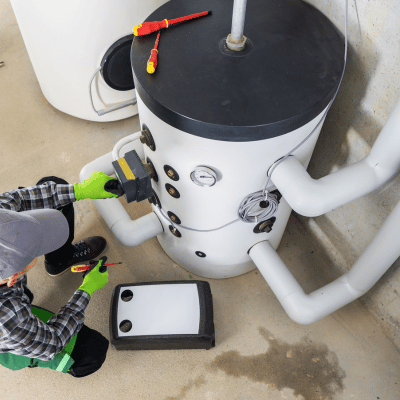
Preventative maintenance, such as regular inspections, cleaning, and energy efficiency upgrades, can help extend the life of your heating system and reduce repair costs.
Maintaining your heating system actively and proactively guarantees its efficiency, reliability, and lifespan.
Regular Inspections
Having your heating system professionally inspected at least once per year can identify potential issues before they become major problems, saving you time and money. Regular inspections can spot problems such as:
- Unpleasant odors
- Dirty and clogged air filters
- Gas line leaks
- Strange noises
- Carbon monoxide leaks
By addressing these issues early on, you can ensure your heating system’s efficiency and comfort.
Cleaning and Maintenance
Cleaning and maintaining components such as filters, vents, and coils can improve your heating system’s efficiency and prevent breakdowns. For example, cleaning a reusable furnace filter by rinsing it with water and letting it dry completely can help maintain airflow and prevent strain on the fan motor.
Keeping your heating system clean and well-maintained enhances its performance and helps avoid expensive repairs.
Energy Efficiency Upgrades
Upgrading to energy-efficient equipment and implementing energy-saving practices can reduce your energy bills and prolong the life of your heating system. Installing programmable thermostats, improving home insulation, and upgrading to high-efficiency furnaces or boilers are some of the energy-efficient upgrades you can make to your heating system.
Investing in energy efficiency guarantees increased comfort and reduced utility bills in your home.
Heating Repair Costs and Financing Options

Heating repair costs can vary widely based on factors such as the type of system, the severity of the issue, and labor rates.
However, financing options like payment plans or credit options are available to help homeowners manage the expense of heating repairs and replacements.
To ensure the best results, it’s important to choose reliable heating repair services.
Factors Affecting Repair Costs
Factors affecting repair costs include:
- The type of heating system
- The complexity of the issue
- The cost of replacement parts
- Labor rates
For example, the average furnace repair cost, including labor for heating system repairs, typically ranges between $150 and $300, but the exact cost may vary depending on the required repair and other relevant considerations.
Understanding these factors can help you better estimate the cost of your heating repairs.
Financing Options
Financing options such as personal loans, financing offered by service providers, and even credit cards can help homeowners manage the cost of heating repairs and replacements. However, be mindful of high interest rates on credit cards, which may make repairs more costly in the long run.
Considering various financing options helps manage the resources needed to meet your heating system needs without significant expense.
Signs It’s Time to Replace Your Heating System
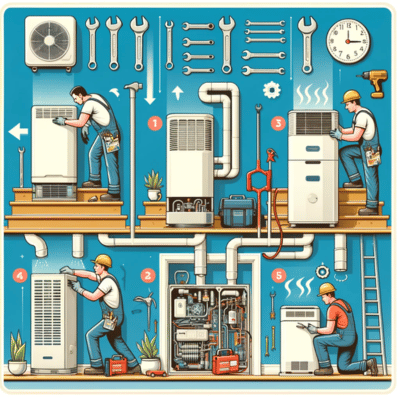
If you find yourself dealing with frequent repairs, increasing energy bills, or an aging heating system, it may be time to consider replacing your heating system with a new, more efficient model.
Recognizing the signs indicating the need to replace your heating system aids in making an informed choice and possibly saving money over time.
Age of the System
The age of a heating system can impact its efficiency and reliability, with older systems more likely to require costly repairs and replacements. For example, furnaces and boilers typically last 15 to 20 years, while heat pumps have a shorter lifespan of 10 to 15 years. Regular maintenance can help extend the lifespan of any heating system, but it’s important to recognize when it’s time to invest in a new, more efficient system.
Increasing Energy Bills
Potential causes of increased energy bills in heating systems may include:
- Increased energy demand
- Inadequate insulation
- Incorrect thermostat settings
- Inefficient furnace or HVAC system
- Ductwork leaks
- Dirty air filters
If you notice a significant increase in your energy bills, it may be worth considering investing in a newer, more efficient system to improve energy efficiency and reduce costs in the long run.
Addressing these issues and upgrading to a more efficient heating system, such as a hot air system, results in lower energy bills and increased home comfort.
Frequent Repairs
Frequent repairs can signal that a heating system is nearing the end of its lifespan, and replacing the system may be more cost-effective in the long run. It is wise to replace a system if the repair cost is more than 50% of what a new one would cost. This is an example of when it’s best to replace rather than repair..
Comparing the frequent repair costs and the benefits of a new heating system assists in making an informed choice and possibly saving money over time.
Summary
In summary, understanding your heating system, recognizing common repair issues, and knowing when to perform DIY repairs or call in professional help can save you time and money. By investing in preventative maintenance, energy efficiency upgrades, and knowing when it’s time to replace your heating system, you can ensure optimal comfort, lower energy bills, and prolong the life of your heating system. Don’t let a malfunctioning heater ruin your comfort – take control of your heating system today!
Frequently Asked Questions

How much does it cost to fix heat?
Repairs for electric furnaces typically cost between $50-$300, while repairs for gas or oil furnaces tend to range from $375-$1,200. The cost of replacing a dirty filter is usually minimal and can be completed in just a few minutes.
What are the most common furnace repairs?
The most common furnace repairs include clogged air filters, defective thermostats, faulty pilot or ignition controls, blocked exhaust vents, and motor or fan malfunctions. Malfunctioning burners, condensate leaks, thermocouple issues, broken blower motors, and non-working transformers are also among the most frequent furnace problems.
How do I fix my home heating system?
Check that your thermostat is set to “Heat”, change the filter, make sure the gas is on, clear the chimney exhaust flu, clean away leaves and debris from exhaust vents, flush out the drain lines, check for blocked ducts restricting airflow, check your thermostat, inspect your circuit breaker, make sure the heating system is on, check the pilot light, replace the filter, check the temperature setting, check the flame sensor, see if the thermostat is responding, check the thermostat settings, check the circuit breakers, check the ON/OFF switch, open and securely close the furnace door, and check the gas valve by your furnace. To fix your home heating system, you should troubleshoot the cause by following these steps.
How often should I replace the air filter in my heating system?
It is recommended to replace the air filter every six months to one to three months.
What are the signs that my heating system needs to be replaced?
Increasing energy bills, frequent repairs and the age of the system are all signs that your heating system may need to be replaced.


